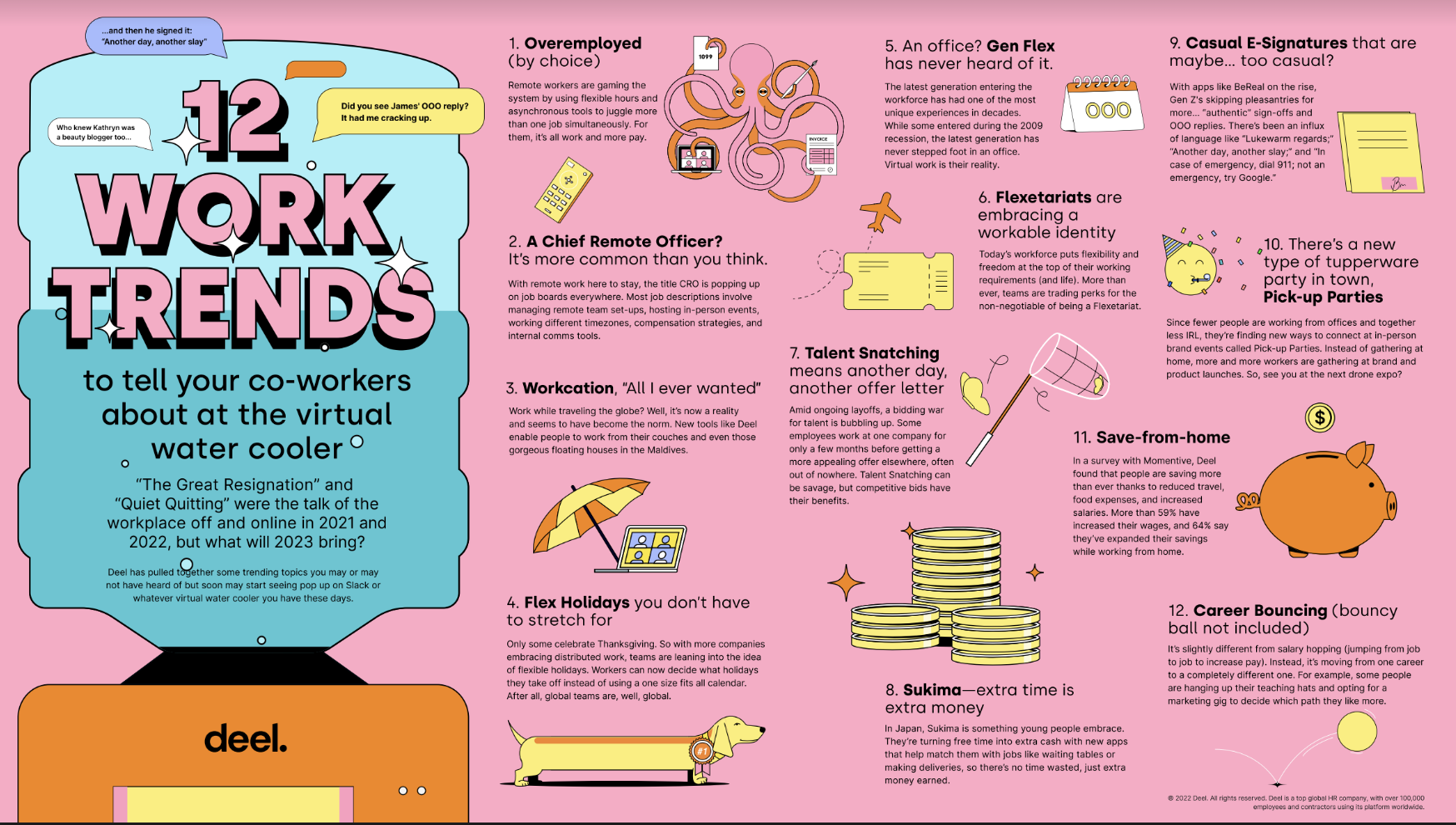Let’s face it: work, as we knew it, has changed a lot, especially in the past two years since the Covid-19 pandemic struck.
And truth be told, with the way things are going, they will continue to change at least in the near future, and we all should keep pace with emerging trends.
Luckily for us, Deel, a US-based company that provides global payroll for employees and contractors from around the world, has drawn up a list of work trends to look for in the coming year.

“2022 saw a shift in the way we perceive the role of work and the importance of work-life balance – with more employees seeking flexible work arrangements such as fixed off-site days, 4-day work weeks, or flexible hours that empowers them to pursue their desired lifestyle and needs,” the company said.
- Overemployed (by choice)—those of us who work from home know this one well. You’re overemployed when you use flexi-time and asynchronous tools to juggle multiple jobs for higher pay. (If this is you, good on you!)
- Chief Remote Officer—new position, and it’s got the word “Chief” in front of it (oooh!). If you think you can manage a company’s WFH team, this may be the job for you. To give you an idea, “most job descriptions entail all the elements around remote team set-ups, including hosting in person events, how to work in different timezones, comp strategies, and internal comms tools,” Deel says.
- Workcation. Say what now? It’s a fancy word that means “work from anywhere” and it means being able to work at the poolside in a villa in the south of France as more and more people combine work and vacations, thanks to new tools such as Deel.
- Flex Holidays. Nope, you don’t have to take off the same holidays everyone else does, but you have the power to decide on what days off you want. (It has the added bonus of not having to face annoying relatives during actual holidays.)
- Gen Flex. Some of the newest members of the workforce all over the globe may have never even set foot into a brick-and-mortar office, which would have been mind-boggling even a few short years ago. More power to them, we say.
- Flexetariat—if you prioritize freedom and flexibility at work, this is you. Kudos on getting a better work-life balance than your elders.
- Talent Snatching. Deel called this an “interesting trend” amid ongoing layoffs, where, unlike previous generations of workers who stuck to one job for years, today’s talented workers are being poached with offers coming in with better perks.
- Sukima: extra time is extra money. This trend comes from Japan, obviously. Young workers are converting their spare time into extra cash using apps including Jobcase, Timee and LINE Sukimani, to match them with gigs like waiting tables or making deliveries.
- Casual sign-offs. A small dose of casualness seems to have been infected into the professional nicety of email signatures. Deel says, “there’s been an influx of language like, ‘Lukewarm regards;’ ‘Another day, another slay;’ and ‘In case of emergency, dial 911; not an emergency, try Google.’
- Pick-up parties. These sound like a cool way to meet new people, since after all, more of us are staying home these days. So these are brand events where people who ordered items from the brand get to come together to claim what they ordered, instead of them being delivered to their homes. Hey, at least you already know you have something in common with that guy who also ordered the thingamajig from whatchamacallit.
- Career Bouncing. Again, in a departure from our one-career workplace ancestors, younger hires jump from one career to another—from teacher to marketer, for example, in order to find out for themselves which career suits them best.
- Save-from-home—this is good news that may just mean added wealth for younger workers, who are saving more whilst working from home because their expenses have gone down.
“More than 59 per cent have increased their salaries and 64 per cent say they’ve increased their savings while working from home,” Deel said, based on a survey it carried out with Momentive, a management solutions company.
/TISG

